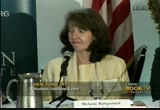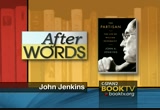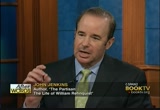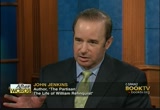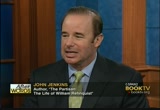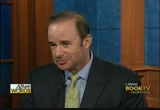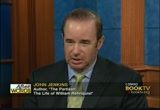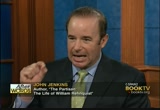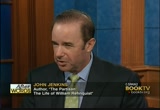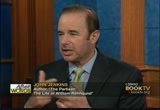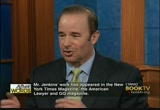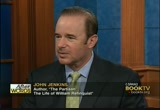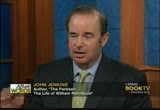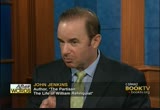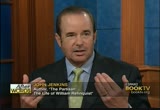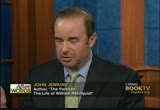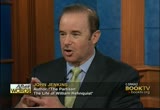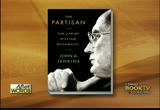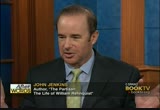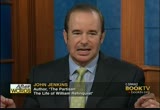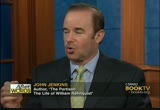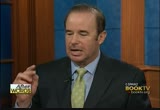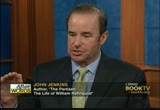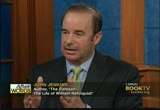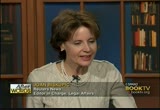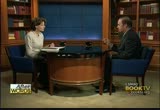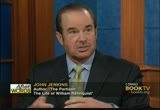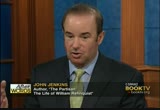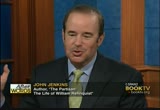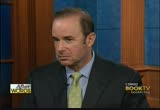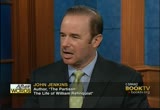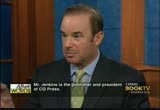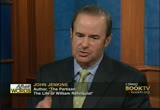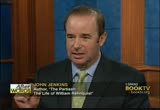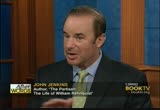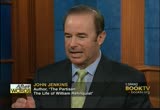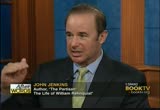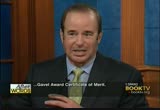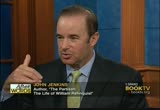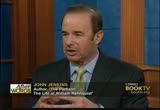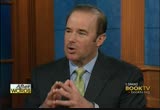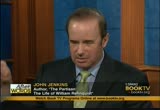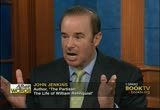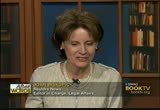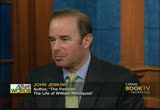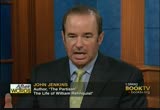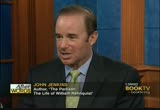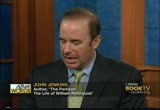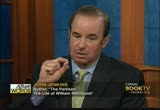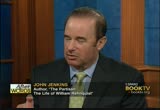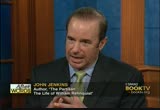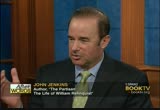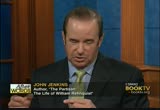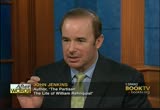tv Book TV After Words CSPAN October 7, 2012 9:00pm-10:00pm EDT
9:00 pm
it comes with a responsibility. melanie has outlined our responsibility and the cause for human rights. when i was working for president bush he gave me a book the he had just read col the aquarium's of p'yongyang. i hope president obama gives this book to everyone in his staff certainly everyone involved with asia policy. for policymakers and important book to understand the dimensions of the tragedy. thank you for coming today >> you're watching booktv on c-span2, 48 hours of nonfiction authors and books every weekend. >> coming up, booktv preps "after words," an hourlong program where we invite guest hosts to interview authors.
9:01 pm
this week legal journalist john jenkins and his book "the partisan: the life of william rehnquist." in it, the publisher of cq press details the early career and the 33-year supreme court tenure of the former chief justice. he talks with supreme court reporter and the biographer for justices o'connor and scalia, joan biskupic. >> host: welcome, john jenkins. >> guest: thank you. >> host: we're here to talk about "the partisan: the life of william rehnquist." i'm going to start with one general question just to give our viewers a sense of who the chief justice is and why william rehnquist was important. there have only been 17 chiefs, correct? >> guest: correct, that's right. >> host: tell us about the position, what does a chief justice of the united states do and the importance of william rehnquist, and then we'll go into his chronology. >> guest: well, the chief is really, he has two roles in the judicial system. he's, first, kind of the chief among equals on the court.
9:02 pm
he assigns the opinion when he's in the majority, he leads the discussion at conference. so he has a very important role to play among the nine justices, and he's really the key guy there, particularly when he's in the majority. but the other thing that rehnquist was and that the chief is is really the head of the entire administrative office of the u.s. courts. he sort of runs the entire court system, and that's a whole part of his administrative responsibility that the other eight justices don't have. but that's what a chief justice does. >> host: and we'll talk a little bit about how he got into that position, but let's go back to the beginning. wisconsin, a suburb of milwaukee, he was born october 1st, right around this time, 1924. his father was a paper salesman, and his mother was a homemaker, but she was the dominant force in the household, right? tell me a little bit about, um, mrs. rehnquist and a little bit about how she got him to change his middle name which was what
9:03 pm
changed the course of his life. >> guest: well, she was very superstitious in terms of the middle name. they named him william donald rehnquist when he was born on october 1st in 1924. and, um, his mother, though, believed, um, she was really a very, very fascinating woman. she spoke five languages in addition to english. don't ask me what those fife were, they're in the book, they're a footnote in the book. [laughter] >> host: right. >> guest: but she was very learned. she was very proud of her education at the university of wisconsin. both his father and his mother were wisconsiners. hadn't traveled far at all, and they were very, very middle class folks in the depression, and the father is a paper salesman. he had gotten through high school. he actually lost the family house, he was the breadwinner. and in 1939 his house was sold at auction in shorewood, wisconsin n this very bucolic,
9:04 pm
leafy be suburb -- leafy suburb of milwaukee. it was sold for the debt that was on it which was $7,000. so the family had been kind of through some very dire straits. they were also very conservative. they were, they were america firsters which meant they didn't want america to be if world worr ii, they were against the new deal and franklin roosevelt, they were very, they were a very, very conservative household. where that conservativism came, on on the parents' part, who knows, except it was pretty common, i think -- when i was doing my research -- commonly found in that particular suburb at that time, the folks that i interviewed told me. when rehnquist was going into the army, just to jump up a little bit on the last name, when he was going into the army, his mother -- who was very superstitious, and rehnquist, also, was very superstitious --
9:05 pm
>> host: he was. >> guest: and so his mother believed that if he had a last name -- >> host: a middle name -- >> guest: a middle name, i'm sorry, that started with h. and had five letters in it, that that would be good luck for him. and a numerologist had actually told her that. so when he was going into the army, he researched his genealogy, and he found he had a grandmother on his mother's side whose last name was hobbs. so he changed his name himself. and he told harry blackman, who was his seat mate on the court, he wrote a note to blackman and said that he had changed it in high school. but actually i think his recollection was probably incorrect because he changed it when he signed up for the united states army in 19 -- in early 1943 when he enlisted in the army. at that point they asked him what his middle name was, and he said hobbs. and that was his name. he was always william h. rehnquist after that. >> host: so interesting, because he did tell that story to
9:06 pm
reporters toward the end of his life with the idea being that the hobbs made the difference, that h, and that i remember one of my colleagues quipped, so you would have been just a justice of the peace rather than chief justice of the united states without it? >> guest: yeah. [laughter] >> host: one of the more crucial moves in his life after he leaves milwaukee and goes to stanford law school is becoming a clerk to supreme court justice robert jackson. tell us a little bit about how that came about, because i want to lead into what you unfold in here having to do with some of his conservativism on blacks and whites. >> guest: right, right. jackson was a, was, i think, seen by then even as a great justice. >> host: uh-huh. >> guest: and he had been the prosecutor at the nuremberg war trials. he'd actually taken time off from the court and gone to nuremberg and been the chief prosecutor and then come back to the court. and so rehnquist graduates from the stanford law school early at
9:07 pm
the end of 1952. he was, actually, in the class that would have graduated a semester later, but rehnquist finished his work. he was so smart -- >> host: yeah. >> guest: -- he got out early. so he wanted to, he -- it was clear when i was researching through his papers and looking at the diaries that he had actually, that were on deposit with his papers, which were fascinating. he had six notebooks that were filled with his reminiscences and his desires and early, um, early comments and memoirs. and one of the things that was clear was that he really saw himself destined for some important job. he actually on the court probably or certainly somewhere in government because he had asked himself as a student, he had actually written what now, honorable w.h. rehnquist with a
9:08 pm
big question mark. >> host: as a law school student. >> guest: as a law school student. as an early law school student. what now, honorable w.h. rehnquist. so that really fascinated me because it really said that he had this feeling of, um, almost a destiny to be on the court when he was very, very young. but there was this confluence of events where jackson plays a role that allowed him to do that. he had a professor who had taken an interest in him, and so the professor was friends with robert h. jackson. and jackson was going to be coming out to stanford. you have to remember, it was hard to get out there from washington. >> host: that's right. we're in the early '50s. >> guest: early '50s. it was hard to get out there. it was rare for someone from stanford -- stanford had a very good law school, and rehnquist was just whip smart, but it was hard for someone who wasn't in the ivy league to be a clerk on
9:09 pm
the court. it was very much an honor. and it was hard. actually, the justices in those days, jackson had been working with one clerk. >> host: uh-huh. >> guest: so maybe nine people or ten, eleven people a year are getting these clerkships, not many. and they're coming out of the ivy league. >> host: am i remembering right that justice jackson comes out for a groundbreaking for the law school? what brought him out there? >> guest: two things. what really brought him out was the bohemian grove in monte rio, california. i actually worked on another story about the bohemian grove, so i know that place well. >> host: men's club. >> guest: right. it's a men's club. it's all men. 2,000 men getting together kind of at a summer cache, and they do -- camp, and they do it every year as -- there was a bow hemoyang club in san francisco, and it hosted this con fab of corporate decision makers, government luminaries, diplomats, very, very important
9:10 pm
people. probably the equivalent today of, you know, some of the big events that happen in aspen and out, you know, when you see folks in shirt sleeves kind of rubbing elbows with each other. so jackson actually was coming out in august of that year, 1952, to do that. and so his professor said, you know, first he asked jackson would you come and there was a groundbreaking at the law school, would you come out and speak at that? the professor agreed. and then the professor said i'm going to arrange for you to meet him. now, the interesting thing is rehnquist did meet him and met with jackson, and jackson just kind of, didn't even really interview him. he talked -- rehnquist had a swedish ancestry which he talked about a lot, was kind of a talking point of his always. so jackson got off on this tangent of talking about his swedish clients that he had had and told rehnquist some stories,
9:11 pm
and rehnquist really didn't get a chance to, um, to really talk about himself very much. >> host: uh-huh. to impress him with his smarts. >> guest: he didn't really think that he had done a good job in the interview. and jackson thanked him and said it was nice to meet you, went on his way, and that was that. so rehnquist doesn't hear anything now for a couple of weeks, so he starlets getting worried. -- he starts getting worried. and he writes a letter to jackson. and he say, you know, i'm in my last semester of law school, i really have to kind of figure out what i want to do. he says i've got a number of interviews and offers, he says, in california. >> host: but that's not true, right? >> guest: well, it doesn't look like it's true later. it doesn't look like it's true, but he says this. rehnquist later said it wasn't true, he confessed to jackson that it wasn't true. so rehnquist says i've got all these offers, and i need to make a decision, so can you help me out here? and it was really kind of smart on rehnquist's part. and jackson comes back, and he says, you know, i think we can
9:12 pm
use, as jackson put it, a second man. [laughter] i think we could use a second man. and maybe by march of next year, because i think the workload is going to be really, really hard for one man. and it was, man, i mean, in those days the court -- >> host: definitely. >> guest: -- they were the clerks. so rehnquist then petitions. he says, i could come earlier. i'd like to be there in january. so jackson says, okay, come out in january. and, basically, that was it. so rehnquist kind of right man, right time, the timing was perfect, and rehnquist drives this little studebaker which he tells about in his memoir about the supreme court. he drives this little studebaker out to washington with no heater ands caught in a blizzard -- and gets caught in a blizzard. but he gets there, and he shows up at the court, and he actually starts working. and he's in awe of the supreme court and the corinthian columns in this great place that he's now in. >> host: right. and that's a really big break
9:13 pm
for him. you know, obviously, he had proven himself academically, very smart, got into the schools he applied to. but here is a crucial move with justice jackson. but it also leads to something that haunts him for the rest of his career. >> guest: right. >> host: and that has to do with his memos in the brown v. board of education case. >> guest: right. >> host: why don't you tell us what his role was and why it turned out to be controversial. >> guest: well, he actually wrote a number of memos, and those memos kind of stumbled out on stage in a very rough sequence over, many years later, and they came back to haunt him. what he did, so he gets there, and percolating up through the courts already going back to, back to 1950, are the cases of the naacp legal and education defense fund that thurgood marshall is actually bringing. and he's building it sort of brick by brick, block by block.
9:14 pm
thurgood marshall not yet, of course, a justice of the supreme court. he's making the case that plessy v. ferguson and, um, which defined the acceptability of separate but equal, they're making the case through the naacp that this is, um, cannot be, cannot remain the law of the land. and it's pretty clear that the case that is going to become a very, very important one for the court -- and it's actually the year that rehnquist is there -- is brown v. board of education. and so, which turns out, in fact, to be the case that strikes that doctrine down. very, very important. and a unanimous verdict of, unanimous decision of the supreme court. so rehnquist is, part of the role of a clerk is to offer his advice and opinions to his boss about these cases. and so rehnquist writes a memo
9:15 pm
about brown v. board of education, and he basically says that plessy should stand. rehnquist authors this memo, gives it to jackson. jackson doesn't -- if jackson, i'm sure jackson read the memo, but he puts it away and, of course, jackson is one of the nine justices who unanimously vote to strike down plessy v. ferguson in this very, very important case which finally is decided in 1954. it actually was reheard the year after, it was reargued the year after rehnquist -- >> host: right. with the significant theme that it gets rid of separate but equal. >> guest: gets rid of separate but equal, but rehnquist was against the finding, the holding in that case. rehnquist believed as a supreme court clerk that that was the wrong outcome, and he argued passionately. if you, if you think back when i
9:16 pm
was looking at his early years at stanford, it's clear that this is not something new. >> host: uh-huh. >> guest: okay? >> host: new to him. >> guest: new to him. this is not something new to him. this is really in his firmament. he believes that this, plessy is right and should be affirmed, as he says in the memo. there are some other cases that are, there are many, many cases at this point that are coming along that, um, that the court is having to decide whether to accept. and there actually is another case that's a voting rights case, but it's a discrimination case. and that case is called terry v. adams. >> host: right. >> guest: and so it also comes up the same year. and the issue in terry is whether or not a, this club in texas -- which is called the texas jaybird club, and it's a democratic club, democratic social club that if you're not a member of the club, you cannot vote in the primary, in essence, and only white people are
9:17 pm
allowed to be in the texas jaybird club. so the issue in that case is should they take this petition for serb rory and hear the case. and rehnquist writes two memos about terry v. adams basically saying that the right of association -- and, again, this goes way back to the sievism of his -- conservativism of his youth and probably his parents and such -- but he writes in two more memos to douglas, to, um, jackson, um, asserting very, very strongly that the right of free association is such that the supreme court should let this case go, leave it alone. and, also, espousing some views that are basically, he says, it's about time we understand that white people and plaque people don't like -- black people don't like each other, and let's just move on. and so those memos, all of which are now in the archives of jackson, but those archives were closed. and so it's only when they start
9:18 pm
leaking out -- >> host: right. >> guest: first one in 1971, the brown v. board of education memo comes out in 1971. the terry v. adams memos, i actually revealed for the first time in an article in "the new york times" -- >> host: let me stop you here. that's when he's, of course, nominated to be an associate justice. that's when the brown memos come out. but let me ask you about the terry v. adams memos that you found. you say that puts him squarely on record as an ardent segregationist. now, you chalk up a lot of it to his era, but many of the other clerks at the supreme court during this time were of the same era, many of the justices were from -- all of the justices were even from a previous era. he seems to have taken his views a little bit further than maybe even his parents held. what is your idea of the roots of them other than just the times and shorewood, wisconsin, was conservative, but it didn't stand out in its conservativism.
9:19 pm
>> guest: right. you're absolutely right. my, and i have thought so much about this and struggled over this really in terms of i want to portray, i wanted to portray his life very, very accurately and fairly, pulling no punches. but at the same time, not landing them if they're not deserved. and so i think that, um, and so i've thought about it a lot. the issue for rehnquist was he believed so passionately in individual freedom, and, you know, in his day i don't even know whether the phrase libertarian was one that was bandied about that much. but really that's where he was coming from. and i think that his, um, his views which i say in the book were clearly racist and segregationist even by the standards of the time, even considering the standards of the time, they were certainly more extreme and more -- and he went out of his way to, um, we
9:20 pm
haven't yet talked about his time in phoenix, but i hope we get back to that because he went out of his way when he moved to phoenix -- >> host: right. >> guest: -- and practiced law after his clerkship to really pick fights with the other side over this. he really wanted to make a strong case because he believed so passionately, um, and was an idealogue, but also idealistic about individual freedoms. and i think that's why he did this. i, i say that he was really an unconscious, this was an unconscious racism. if it was racism, it was unconscious on his part. he was probably -- he couldn't possibly have been aware, so self-aware at that time of how he would be perceived later. clearly, he understands, wow, i was really out there. and then he has another problem because by the time he's nominated in 1971, he's clearly well qualified for this position
9:21 pm
on the court. he's got some explaining to do about the '60s and the '50s. and it's how he handles that that, i think, is actually as revealing as anything at this point. >> host: okay. so then let's close the loop on that before we go back to the chronology, and that's his testimony in 1971 when he's nominated to be an associate justice on the supreme court by richard nixon, and then in 1986 when he's nominated to be elevated to be keefe justice by ronald -- to be chief justice by ronald reagan. both times these memos come up. both times he outright denies the sentiment you're describing, and you basically portray him as outright lying. and you think rehnquist, do you think william rehnquist ever faced that lieover was he in denial as he got further? >> guest: i think he was in denial. i think he was in denial. the situation in 1971 is that the hearing record is basically closed. >> host: uh-huh. >> guest: he's testified, he's
9:22 pm
so slick and smart and excellent in his parrying of these questions both in 1971 and again when he's nominated in 1986 to become chief justice. the senators, birch, bayh, ted kennedy, people that are -- joe biden, they don't lay a hand on him really. so he's so excellent at parrying these questions. and the hearing record in '71 is closed, and then suddenly shortly before the vote is to take place on rehnquist and also on louis powell who was up at the same time -- >> host: right. >>ing the um, shortly before that a vote is to occur, "newsweek" magazine -- the supreme court reporter for "newsweek" was a really great guy, and he comes up somehow with this memo from the jackson files. the memo relating to brown v. board of education. and it's a bombshell.
9:23 pm
and so birch bayh, a very liberal and great senator from indiana at this time, he's leading the fight against rehnquist. he's leading the liberal fight against rehnquist. and they know it's going to be close. they probably also know they're going to go down in flames, but it's close, and bayh senses this can actually make it closer. so he starts really pushing, and the publicity starts coming out, and nixon and his attorney general, john mitchell, who actually have kind of concocted this whole rehnquist nomination as a whole other story there that's fascinating. >> host: right. >> guest: so nixon and mitchell start to worry that they're going the lose this pr battle, that things could go south on them. nixon had had a lot of trouble getting his nominees confirmed. >> host: yeah. >> guest: on just these basis -- on just such a basis as this. so rehnquist professes that he actually doesn't even remember this memo. it's possible. um, because he doesn't remember
9:24 pm
it, he very, could be very unconsciously or he could very consciously believe that he didn't write it or that he wrote it, as he said at the time, he explains it that this was, this was justice jackson's request -- >> host: right. >> guest: -- for a summation of his views, not of my own. now, that actually, there was no one there that could rebut that even though there were opinions expressed both ways. rehnquist was not under oath, so he submitted a letter to the chairman at that point of the judiciary committee and said this is, this is my recollection, it was justice jackson's views that i was espousing -- >> host: right. just to remind people, this is coming after the hearings. >> guest: after the -- >> host: now not under oath, and it's 1971, so the jackson supporters aren't able to come through and say this would never have been his views. >> guest: right. bayh wanted the hearings reopened, they were not reopened. so what happens is he manages to skate on that. probably lost some votes, but he
9:25 pm
manages to skate, and he is approved by a vote of 68 -- my recollection is 68-26. and, um, which is a lot of votes at that time for there had been some nominees that hadn't been approved. but for someone to be approved at that time, usually it was unanimous. and it was far from unanimous. and i think probably that stung a little bit. but rehnquist did get onto the court. he managed to skate past that because the memo came in late, and he was not under oath, and he could say, and he probably very well believed it, i don't remember this, and it must have been justice jackson's views. so that's what he did. it comes up again later, in 1986, because now we have the memo all over again, now the naacp can bring in the folks who hadn't testified before to testify to the other side of that. and then by then, also, you have the terry v. adams memos. and when you start looking at
9:26 pm
the, his activity in phoenix during the 1960s, um, very, very conservative and against public accommodation laws and such. >> host: right. >> guest: um, his outspoken opposition to integration and the memo not only in brown, but then terry v. adams and the other writings he did. it begins to look like, suddenly it begins to look like a preponderance of evidence in 1986 that he, in fact, um, probably very much was lying about this, if he even remembered it. but it was his views. >> host: let me ask you real quick because we only have a few more minutes in this segment. but he somehow is able to sort of skate by some of these very tough questions by senator edward kennedy who at this point is controlling a lot of the opposition to him in 1986, the senator from massachusetts, of course. and because of his sort of political smarts having worked in the justice department, which we'll get to, he, he can control
9:27 pm
this hearing more than usual. tell us a little bit about how he was able to elude these kinds of questions, and did he know, did he know he was lying? >> guest: well, he simply said repeatedly, you know, i'm sorry, i just don't have any recollection of this at all. i just don't have a -- he did not, he did not allow himself to start going down the slippery slope. well, maybe i did, maybe i didn't. let me think about this. he simply categorically denied any recollection. i just don't have a recollection of this. and, and there was a -- it's fascinating -- an ex-fbi agent named james brosnahan who i actually spoke to for this book, i called him up. he was a great witness for the, for the opposition because he had been the fbi agent that had been called to the scene in phoenix in the 1960s during the election when william
9:28 pm
rehnquist was interfering with voters. and brosnahan said, look, he was a very well known and respected lawyer by then in san francisco. and buzz han said, i was there, i was the fbi agent on the -- >> host: who was discouraging black voters. >> guest: rehnquist was giving them a literacy test. >> host: right. >> guest: and, um, which was not illegal, but it was -- but he was really pushing the line to the point where the police and the fbi had to be called to restore order. and rehnquist simply said, that not me. >> host: kind of a mistaken identity. >> guest: case of mistaken identity. >> host: so james brosnahan comes to washington, puts a lot on the line -- >> guest: puts a lot on the line and really gets hammered because in the end he's not left with anything that really he can grab onto to come back at rehnquist. rehnquist simply says i just
9:29 pm
can't explain it, t just not me -- it's just not me. and that was very, very, i thought, cagey. it was very typical, i thought, when i met with rehnquist ten years later, um, very, very typical of the way that he parried a question that he just didn't want to answer. and that's what happened. >> host: fascinating. and if i remember right, whenever james brosnahan who is still a lawyer in san francisco -- >> guest: he is. >> host: william rehnquist would recuse himself from the case. so it stayed that way. let me just finish out one other thing, and then we're going to take a break, and that's how he -- you referred to his time in phoenix, and then he comes to washington, d.c. with the justice department. just let us know how he came here right after richard nixon was elected in '68. >> guest: rehnquist went back to phoenix, and he decides that he's, he jumps in to everything that he can possibly join to become a better known business-getting attorney.
9:30 pm
and he's extremely successful, by the way. very little known are, um, the amount of property that he was able to amass and wealth by the standards of that time in phoenix. he was very successful. he meets the proteges and supporters of barry goldwater who is really shaking things up, and, um, kind of as a precursor to ronald reagan. goldwater back in the early '60s. and so e hitches up with these guys -- he hitches up with these guys, and one of the people he meets is richard kleindenst. and he's a key guy for goldwater and it has also gotten the attention of the nixon administration. and john mitchell who's nixon's best friend, campaign manager and is going to be his attorney general. so kleindenst is invited to become the number two man at justice, and he says i need rehnquist with me. he's really smart. this guy is smart. and mitchell opposes it at first
9:31 pm
because he says we don't need more than one cowboy. one cowboy is enough -- just from arizona, right. >> guest: one cowboy from arizona's enough. but kleindenst persuades him to bring rehnquist to the pierre hotel where their transition headquarters is. and rehnquist comes in, and he leaves a private meeting with mitchell, and he's got the job. >> host: second big break. robert jackson, richard kleinden srx st, and we'll pick up after this. >> guest: okay, thank you. >> host: thank you. >> on the go? "after words" is available via podcast through itunes and xml. visit booktv.org and click podcast on the upper left side of the page. select which podcast you'd like to download and listen to "after words" while you travel. >> host: welcome back, john jenkins. we're going to pick up on the chronology ofwomen yam rehnquist -- william rehnquist
9:32 pm
who was our 16th chief justice of the united states. but first let me ask you a few questions about you and how you decided to write this book. i know you did a piece on william rehnquist in 1985, but here we are in 2012. i know it didn't take you that long. [laughter] >> guest: no, it didn't take me that long. >> host: so tell us a little bit about why you decided to do it at this point. >> guest: well, in 1985 i, i was assigned this story by the times, and i met with rehnquist twice for the interviews in 1984. it's kind of interesting. he -- i'd written him a letter and introduced myself. he had not begin, to my knowledge, any interviews at all, and we were not sure if he would accept this at all. but he sent a letter back right away. he was very punctilious about that. and he said, you know, why don't you come in, and we'll get to know 'em ooh other a little bit better, and then i'll decide whether i want to cooperate or not. and i vowed, i'm just going to
9:33 pm
go in with my tape recorder and my questions and be fully prepared, and i'll let him throw me out if he doesn't want to have this conversation. and, in fact, he had the conversation, and we had two very, very good meetings. time goes by. i -- during my research for the times, my editor at the time was encouraging me dig, dig for the origins of his conservativism. what is that? there's got to be more here. this guy is kind of wired from the birth almost as an arch conservative. dig hard for that, john. and so i did, and i think i did a credible job with the information available. but after his death and the availability of papers, it took stanford -- he had given his papers to stanford university -- >> host: to the hoover institution. >> guest: to the hoover institution at stanford, considered a very, very conservative -- and it is -- institution. and he put significant restrictions on the papers that he probably wouldn't have been able to do had he given them, as
9:34 pm
many justices do, to the library of congress. so three years after his death the papers become available. that's probably 2008. and, and so i knew that i needed to jump on that and be the one to go through those pape ors -- papers and, hopefully, find something that would help me tell the story of this man. and the papers were just a vast trove. he -- the case documents are still largely locked up because one of the considerations he has is that no papers can be available from the -- related court cases, when any justice who participated is still alive. and, of course, john paul stevens comes on the court as an appointee of gerald ford and is still alive. so there are a lot of cases going all the way back there that are not opened. but the cases from the first few
9:35 pm
years were. but i was more interested in his personal papers, his letters to his children, his letters to his family, his diaries, the books that he, that he made notes about and all that's just fascinating. and in thousands upon thousands of files that are out there at the hoover institution. >> host: that's great. and several of the justices with whom he served also had opened their papers. >> guest: yes, they had. >> host: powell, who kept every note that william rehnquist wrote to him. >> guest: and so did harry blackman. harry blackman kept every note and the entirety of those notes. blackman put absolutely no restrictions at all. and powell, even though powell's papers are at washington university, the curators of those papers, they're technically not supposed to be open, i think, but the curators of those papers are very, very helpful -- >> host: oh, completely. i've used them. >> guest: i was very, very pleased, and i have to thank them for those powell documents because that showed a sign of
9:36 pm
william rehnquist as did the papers of blackman and the papers of douglas showed a side of rehnquist that i thought was very important to reveal. >> host: right. speaking of louis powell, louis powell and william rehnquist both come on the supreme court in january of 1972. they're sworn in. tell us a little bit about the role that william rehnquist played in his own selection when he comes to washington where we left off in our first segment. he comes with richard kleindenst, becomes assistant attorney general at the department of justice, and he starts having a hand in selection for supreme court nominees. and lo and behold, in fall of 1971 he becomes one. tell us a little bit about that. >> guest: yes, he does. well, rehnquist is the person that is, that is at the justice department put in charge by and large of vetting the nominees, the nixon administration's nominees to the court. and his record on this is actually very mixed.
9:37 pm
i have to say. and so -- >> host: in terms of who he, who ends up vetting successfully? >> guest: who he ends up vetting successfully and some of the things that he lets slip through, unfortunately, that good or bad he is taking the fall for and the responsibility for. so as i mentioned, nixon, richard nixon had come on to the, into the presidency with a commitment to appoint conservative southerners to the court. that was one of his campaign promises. hard for us to even think about this today, but, um, nixon was a complex guy in his own right. that was one of the things that he had done. and he was, and so rehnquist here in the department of justice is now supposed to be helping him find these guys. and the very first two, um, vacancies, first two nominees that go can up to the court -- that go up to the court are clement haynesworth and j. harold cardswell, both of whom fail to be confirmed.
9:38 pm
and sort of rehnquist kind of takes the fall for that because he had vetted them both and professed them qualified, and then they just got hammered during the hearings. [laughter] so by the time another vacancy comes up and, actually -- so nixon is getting this amazing confluence of four vacancies in his first term. it's pretty amazing. and the vacancies are also coming up at the same time. two very early in his presidency and thin -- and then two more -- >> host: hugo black and john harlan. >> guest: and black and harlan within a couple of weeks each other resign, and then black dies a few weeks later. so nixon was looking to replace black, but he certainly -- he was hoping he could keep harlan because he really liked harlan. but harlan was elderly and blind and had a lot of issues. so by this time hixon and his attorney general -- nixon and his attorney general, mitchell, have decided their going to take this thing over themselves.
9:39 pm
they can't run the risk, and thai actually got another important job for rehnquist at this point with these two new vacancies which is he is supposed to be running a committee to declassify documents. and nixon in his diabolical efforts, nixon believes that if -- and rehnquist, i'm sure, doesn't know this. but when the white house tapes came out lateerer, it turns out that the reason he wants rehnquist to do this is because he believes that if he can get these documents declassified, he can sort of use them to bang the image of the kennedy family, particularly bob kennedy and jfk and even ted kennedy. who he sees as a potential rival in the coming election. >> host: uh-huh. >> guest: and nixon, so the declassification of these documents nixon wants rehnquist to handle so he can leak the documents out. when it turns out rehnquist isn't going fast enough, nixon and his other folks that later are discredited in watergate, they actually just decide they're going to make up some
9:40 pm
documents and leak them anyway. that's a whole other thing. so what happens is rehnquist is busy over there doing that, and meanwhile mitchell and nixon are trying to find two people to announce because nixon wants to move fast on this. >> host: right. this is all in the fall of 1971. >> guest: because he wants to do it fast before the '72 elections, and he also foes that time -- knows that time is his enemy. getting the jump on someone fast after these vacancies comes out is really what he needs to do. and someone has the brilliant idea, actually, fred moore in the white house. but he tells -- he sells the idea -- >> host: is it dick moore or fred moore? >> guest: i'm sorry, dick moore. you're correct. there was a fred moore -- >> host: not in this case. >> guest: dick moore has this brilliant idea that rehnquist is the guy. he's smart and sort of, um, he's really going to be a guy that can be on the court for 30 years or more which, of course, is exactly what happened. and they plant this seed with nixon. mitchell, actually, you can
9:41 pm
listen to the tape, and you can hear mitchell. and nixon's kind of rolling around in his mind, and he first doesn't really like the idea. but he warms to it because he's got a deadline. he wants to make a speech. and, actually, with ten hours before the speech he decides rehnquist is his man, along with louis powell. >> host: it's fascinating. in fact, you mentioned the tapes which any one of our viewers can go and get from the archives. you can put in your little cassette and make a copy and listen to it, and hearing richard nixon -- a aggravated assault of duke law school -- a graduate of duke law school -- get kind of jealous when he's told how smart rehnquist was at stanford, and i remember the president says, well, maybe it wasn't as hard at stanford. because mitchell, the attorney general, is talking about how smart william rehnquist was, you know, fist -- first in his class and also having clerked for justice jackson. so now he's on the court.
9:42 pm
he gets on the court, and this is what you write about him. under rehnquist's view of the constitution, state officials could execute juveniles for murder, they could stop women from having abortions, but they couldn't even give the slightest preference to african-american students seeking admission to a state university. he voted against affirmative action every time the court considered it. that's a timely reminder since the court's about to take it up. tell me about his legacy on the law. >> guest: well, rehnquist's legacy, i think, first of all, is that he made it a very acceptable, he paved the way for, um, for ideological conservatives and also liberals, by the way, to be acceptable as members of the court. and so i think his real legacy is not so much that he was the author of great opinions like, um, brown in the warn -- warren
9:43 pm
era or even roe in the era of berger, but because there really aren't -- to my mind, anyway -- opinions of rehnquist that are particularly memorable. but don't take my word for it, i asked rehnquist what are your memorable opinions, and he said, well, you know, i don't really have any them roll opinions. -- memorable opinions. nothing comes to mind as being particularly memorable, and i think that's an honest and accurate answer. >> host: and that was in 1985. you probably couldn't have said that in 2005 also. >> guest: i agree with you. i think he would have said it in 2005 just as much. so i think that really his legacy is that e came onto the court -- he came on the court with an agenda. and it was a partisan's ayen da. you know, i call the book "the partisan." that was the title of "the new york times" story, "the partisan." and as you know, as a journalist i wrote the story, but i don't get to title it. but i thought that was very, very accurate. and i remember asking him during
9:44 pm
my interviews with him, do you consider yourself a partisan. and he said, yes, i am a partisan. he was unabashedly a partisan. so his legacy, i think, is that he made it acceptable to be a partisan on the court. and if you look at the public opinion polls that trace what the public thinks of the court, i think that during prior chief justices the sort of the sense of the public was that the court is the one institution that's above the fray. the rough and tumble of the white house and congress, that's always been that way. but the court's the one institution that's above the fray. and that has changed. that has clearly changed. you can trace the, um, the sense of what the public feels about the institution of the court. and, um, and they see it now as politicized. >> host: let me ask you -- >> guest: i think that's his legacy. >> host: let me ask you about
9:45 pm
how he got to it and a little bit more about that legacy after we talk about some of his work on the court. he was very consistent in those areas that you cite, you know, in terms of racial remedies, no. in terms of abortion rights, no. >> guest: right. >> host: um, you suggest that it wasn't just his idea of the constitution then because you talk about the political influence. was there also something larger in terms of his idea of society, or was it, you know, the kind of basic conservativism that you trace back to shorewood? was it kind of a collection of factors rather aerothan the -- rather than the constitution, frankly? >> guest: i think that rehnquist had a world view that was set as a very, very young man. i had the opportunity when she was still alive in the 1980s to speak to his english teacher, charlotte walger, who told we -- i mean, the thing that she remembered, and this is really as i'm starting my research, i'm saying tell me about this guy. because someone had said, you know, one of his teachers is still alive.
9:46 pm
>> host: talking about sherwood high school? >> guest: sherwood high school. and her comment was, you know, this was a young man who was very, very sure of himself and conservative and very, very conservative even then, very, very traditional if his beliefs. so, yes, i think that what -- when william rehnquist confronted a case, he did not look at the prior precedent and say let's see what my prior colleagues thought about this. let's see what past courts thought, and i'll be guided by that. he was guided very much by, as he put it, what's on the doorstep at this point, quote-unquote, what's on the doorstep and by his own personal views of it. so, yes, i think he was a very traditional, conservative person who brought that to his view of a case, and keep in mind he had
9:47 pm
read the road to serfdom -- [laughter] in the army. he had had, basically, he quit college, he quit kenyan college after one semester, joined the army and started reading these great books. and he viewed that as the single most important book he ever read, "the road to serfdom," which is really the defining libbertarian -- libertarian philosophy. >> host: this self-taught n some ways, intense reader who can be first in class. he can knock off work at three each day, just very quick. i found him able to have deep memories for facts, all sorts of trivia -- >> guest: unbelievable. >> host: and all sorts of things. >> guest: opera. >> host: yes. geography, you name it. but yet he had these sort of trivial pursuits that you make a big deal out of. you have a whole chapter on his boredom factor. and i know that in the louis powell archives i found letters
9:48 pm
that william rehnquist wrote while he was sitting on the bench hearing cases to louis powell when powell was out sick. >> guest: yes. >> host: and i thought -- [laughter] that's like a kid in eighth grade geography passing a note to someone in front of the teacher, but this is at the u.s. supreme court. tell me why you devoted an entire chapter to this boredom factor, and what do you make of it when you contrast it to this very brainy individual? >> guest: i thought that i needed to explain why he did all these other things. i think that his boredom, i call -- i think the title of the chapter, um, and i did title the chapter "bored at the court." there's no doubt in my mind that he was, he just wasn't intellectually challenged by much of the work that the court did. [laughter] he had been warned about this by bill douglas. >> host: uh-huh. >> guest: bill douglas took him under his wing as a young man, and these guys were so idealogically opposite, polar opposites, and yet bill douglas
9:49 pm
believed that as a young man coming on the court -- rehnquist was 47 when he came to the court, douglas even much, much younger when he was nominated by fdr -- but douglas believed and inculcated in rehnquist that you've got to have a lot of other pursuits. i think that if, that if rehnquist was bored, i think that if he had not been nominated to be the chief, he just needed vast, all, stimulus really because he was so smart. and so i think that if he had not been nominated to be chief, it's clear to me going back and reading my interview transcript with him that he would have retired. he would have retired in 1989. because i -- when he mentioned that, i specifically said are you ready to retire. and this is the end of 1984, a lot of things changed after that. he was nominated in '86. but at that point, '84, he said, you know, i will be -- when i reach the age of 65 in 1989 with
9:50 pm
more than 15 years of service on the court, i intend to leave. and he would, he could take, decide to take cases if e wanted, we could take a senior status. he would be making his full salary. he said i want to do some other things, i want to teach. i think he would have been bored stiff teaching, by the way. but he was also trying to write novels. he would have been, and i was personally just fascinated by this, and i read the normals because they're in his -- the novels because they're in his papers. and so he was trying to become the first justice, it was very secret and very quiet, but the first justice ever to write a novel. it had never happened. i mean, you can check. it still has never happened according to the archivists. and he went to douglas for help because douglas had written over 50 books and hundreds of articles. and he was just a writing pa chien. it was -- machine. it was all nonfiction, but he was a writing machine because he had so many alimony payments to
9:51 pm
make. he'd been married four times, and he needed money. and he was scrounging around. and so rehnquist saw this, and so douglas introduced him to his agent, robbie, who is at that time probably the number one talent agent in hollywood at that time and also great author's agent. and lance introduced him to this whole different world of hollywood and the new york literary salons. and those also came to make him very uncomfortable. >> host: yeah. [laughter] >> guest: but in the beginning he was very, very taken with it. >> host: yeah, yeah. certainly had many, many pursuits off the bench. i'm going to ask one final question having to do with court work and then some points, address some points that you make overall. and this is 1986. when he does decide to stay because, obviously, he gets this amazing opportunity to be the chief justice of the united states. a surprise move. warren burger decideds he wants to head up the constitutional
9:52 pm
anniversary commission, and ronald reagan, basically in the same position that richard nixon was, bedefault ends up -- by default ends up with william rehnquist. tell us about that. >> guest: warren burger has been chief justice since 1969, now it's 1986. so, and he's 79 years old. and he is the chairman of for bicentennial -- the constitutional bicentennial. and berger, um, so many people -- i'm certainly not the first one who made the point that he looked like a chief justice who came right out of central casting. oh, my goodness, and booming baritone, and he just looked the part. but he loved the ceremonial, he really loved the ceremony of the office in a way that rehnquist never did. and he loved the kind of administrative management side of it and thought he was very, very good at it. but he just had a thing for the constitutional bicentennial. so he asks for a meeting with rehnquist. with reagan.
9:53 pm
and so berger -- reagan's people think that berger is probably going to ask for more money, um, for the bicentennial because he believes that it's underfunded. so they debate whether to allow him to come in to meet with reagan or not. but reagan decides to meet with him as a courtesy. and so, um, so berger comes in, and about 20 minutes into this discussion that he's having with the president, he drops the bombshell that he's going to resign. and so they've been waiting for this, and now it is upon them. so the political guys in the reagan white house which includes ed meese, among others, who was by then he's reagan's very, very good friend, but now he's the attorney general, the new attorney general. so meese has already got a short list. and at the top of that short list is rehnquist. because meese believes that rehnquist will, will do exactly
9:54 pm
what nixon believed he would do as an associate justice, and he's right. that rehnquist will come in with an agenda to reverse the, um, what the white house, what the reagan white house sees as the excesses of the warren and the berger courts. >> host: now, the reagan administration was much more vigorous in its pursuit of that angle -- >> guest: yes. >> host: -- than the fix son administration. so was there really ever anybody who would have been in contention against william rehnquist in 1986? >> guest: well, i think sandra day o'connor, actually. you wrote a book about her. i actually think that, um, that at some point, um, a lot of people were discussing o'connor almost from the moment she came onto the court, i think, as potential chief justice. um, whether there was anyone inside the reagan administration that seriously considered that, i don't know. but i know that, um, that there
9:55 pm
were many that thought that that could work. ultimately, i think that when they looked at o'connor, they saw somebody that was just -- she had this human quality about her that she could, she was unpredictable, okay? >> host: they didn't like unpredictability. >> guest: they didn't want unpredictability, and reagan knew that rehnquist was just going to be completely predictable. um, there were, you know, the usual suspects were out there, robert bork was out there at the time and conceivably could have been considered. but i think that in this case it was really rehnquist's to lose, and so it was -- they didn't really have anybody else on their list at that point. and he came in and, of course, whatever thought he had or might have had about retiring is right out the window because now here's a new challenge. even though soon after he gets there he writes to his family, he writes to one of his children that he just loathes the administrative burden that's on im, and he just don't know how he's really going to handle
9:56 pm
that. >> host: actually, he turned out to be pretty good at it. >> guest: very good, actually. >> host: yeah. you write in your introduction that you wanted to, quote, set the record straight. what are some of the most common misunderstandings about william rehnquist? >> guest: well, the anecdotal stories about rehnquist when he was alive always -- because it's easy to make these a touchstone for a story -- they always went back to his, um, practical jokes. >> host: uh-huh. >> guest: and he was a practical joker. sometimes i think there was a little malice to the -- often, i think, maybe a little bit of malice in the practical joking. um, but there, i really, um, as a journalist covering rehnquist i, one of the things i kind of disliked about some of the coverage was, um, it stopped there. so the practical joking, a few anecdotes about the practical joking would be used to, to, um, to say here's a guy who's very
9:57 pm
collegial compared to his predecessor, and, um, and so forth. so i think one of the myths is that he was very jovial and sort of personal and warm -- person able and warm toward the justices. now, i will say this, the evidence in his papers, and that's what i'm using as my guide, but i i think it's very, very valid. he had mixed relations with his colleagues. i think that every one of them at some point felt the lash from william remember wis. -- rehnquist. clarence thomas said he could get things done with a glare, okay? i, as an interviewer, could feel that. i just in my relatively few times that i actually sat across with him, you could feel when you had offended him or had asked the wrong question. he would let you know. so i think he was much more complex than some of those little stories and anecdotes
9:58 pm
would lead us to believe. >> host: finally, let's look forward. because one thing we haven't mentioned, which is very important about william rehnquist, is that he hired a man by the name of john roberts -- >> guest: yes, he did. >> host: -- who is now our chief justice of the united states. and william rehnquist hired him to be a law clerk of his when he was an associate justice. john roberts ended up serving in the ronald reagan and h.w. bush administrations and was appointed to the supreme court in 2005 to succeed william rehnquist after he died from the thyroid cancer. what is the legacy that you believe that william rehnquist gave to john roberts, and do you see him in the same vein? >> guest: well, i see roberts as rehnquist's natural heir. >> host: uh-huh. >> guest: okay? i think -- gls. >> host: in the same partisan vein? >> guest: oh, absolutely in the same partisan vein. now, roberts is a, um, roberts, i think, is a, um, is a more
9:59 pm
deft partisan in some respects, but he's also actually if you believe the academics and you believe -- and i do -- the, um, their methodology and their analysis of the record, he's actually more conservative than william remember -- rehnquist. roberts is more conservative. and there's never been a court as conservative, according to the academic studies, um, and that work, there's never been a court that's more conservative right now than the roberts court, at least not since the 1937 when records really are starting to be analyzed and kept. so i think that roberts is, um, is very much different in some respects from rehnquist. i'm not sure that rehnquist would have voted as roberts did -- he might have, but i'm not sure that he would have voted as roberts did on the affordable care act. >> host: yeah. i -- [inaudible] >> host: i would bet that
185 Views
IN COLLECTIONS
CSPAN2 Television Archive
Television Archive  Television Archive News Search Service
Television Archive News Search Service 
Uploaded by TV Archive on

 Live Music Archive
Live Music Archive Librivox Free Audio
Librivox Free Audio Metropolitan Museum
Metropolitan Museum Cleveland Museum of Art
Cleveland Museum of Art Internet Arcade
Internet Arcade Console Living Room
Console Living Room Books to Borrow
Books to Borrow Open Library
Open Library TV News
TV News Understanding 9/11
Understanding 9/11